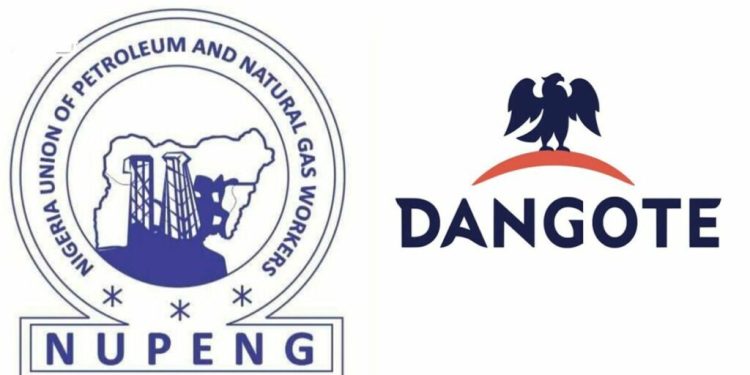By James Aduku Odaudu
Labour unions are vital in protecting workers’ rights, ensuring fair wages, and safeguarding welfare. In Nigeria’s oil and gas sector, the Petroleum and Natural Gas Senior Staff Association of Nigeria (PENGASSAN) and the Nigeria Union of Petroleum and Natural Gas Workers (NUPENG) have historically played strong roles in defending their members. However, their ongoing conflict with the Dangote Refinery risks undermining not only a private enterprise but also Nigeria’s broader national economic interests. This is a fight that must be urgently de-escalated.
- The Dangote Refinery as a National Asset
The $20 billion Dangote Refinery is not just a private venture—it is a strategic national asset. As the largest single-train refinery in the world, it has the capacity to meet Nigeria’s domestic demand for refined petroleum products and even export surplus to other African markets. For decades, Nigeria has depended on fuel imports despite being Africa’s top crude oil producer. The refinery offers a pathway out of this paradox.
Any disruption to its operations will have ripple effects: from fuel scarcity and increased transportation costs to inflationary pressures that affect every Nigerian household. The stakes are simply too high to allow union battles to derail such a transformative project.
- Labour Rights vs. Public Interest
The right of workers to unionize, negotiate, and advocate for improved welfare is fundamental. But in industrial relations, there is always a balancing act between labour rights and the public interest. When union actions threaten to destabilize a facility as strategic as the Dangote Refinery, the collective well-being of over 200 million Nigerians must come first.
By escalating their fight with the refinery, PENGASSAN and NUPENG risk:
- Jeopardizing thousands of direct and indirect jobs created by the refinery.
- Triggering possible layoffs if operations are stalled.
- Undermining the long-term sustainability of the refinery, which would ironically harm the very workers they represent.
- Safeguarding Investor Confidence
The Dangote Refinery is a flagship project that has drawn global attention. If labour unions cripple its operations, it sends a dangerous signal to both domestic and foreign investors—that Nigeria is an unstable and hostile environment for large-scale industrial projects. This perception could deter future investments in infrastructure, energy, and manufacturing, sectors Nigeria urgently needs to diversify its economy.
Investor confidence is fragile, and policy inconsistency, regulatory uncertainties, and industrial unrest are among the top deterrents. A protracted conflict with the refinery would erode confidence, stall expansion, and hurt Nigeria’s international credibility.
- The Public Interest Dimension
Nigeria is already grappling with the aftermath of subsidy removal, unstable electricity supply, and rising transportation costs. Any further disruption in petroleum product supply will inflict additional hardship on citizens. Fuel scarcity, price hikes, and inflation will erode disposable incomes and deepen poverty levels.
The unions must recognize that this battle is not only between them and Dangote but between narrow industrial interests and the collective survival of Nigerians. The national interest must prevail.
- The Way Forward: Constructive Engagement
Stopping the conflict does not mean silencing the unions. Rather, it requires adopting more constructive mechanisms for dispute resolution. Several pathways exist:
- Tripartite Dialogue: The Federal Ministry of Labour and Employment can convene a tripartite forum involving the unions, Dangote management, and government regulators to mediate disputes.
- Arbitration and Mediation: Independent arbitration panels can resolve disagreements on union recognition, welfare packages, or safety concerns without recourse to strikes.
- Corporate Social Responsibility (CSR) Negotiations: Instead of confrontation, unions can push for CSR projects, community benefits, and long-term staff development commitments.
- Phased Union Integration: If recognition is at the heart of the dispute, a gradual integration process could be negotiated to avoid sudden disruption.
- Conclusion
The fight between PENGASSAN, NUPENG, and the Dangote Refinery is not a private matter; it is a national issue with far-reaching implications. While the unions have legitimate concerns, their methods must not endanger Nigeria’s economic stability, job security, and energy independence.
A refinery that promises to save Nigeria billions in foreign exchange, stabilize fuel supply, and attract global investors should be protected, not sabotaged. For the sake of workers, investors, and citizens, this fight must stop—and constructive engagement must begin.
Dr James Aduku Odaudu is a development administrator, communication consultant and the CEO of Sunrise Media Limited. He can be reached at jamesaduku@gmail.com















